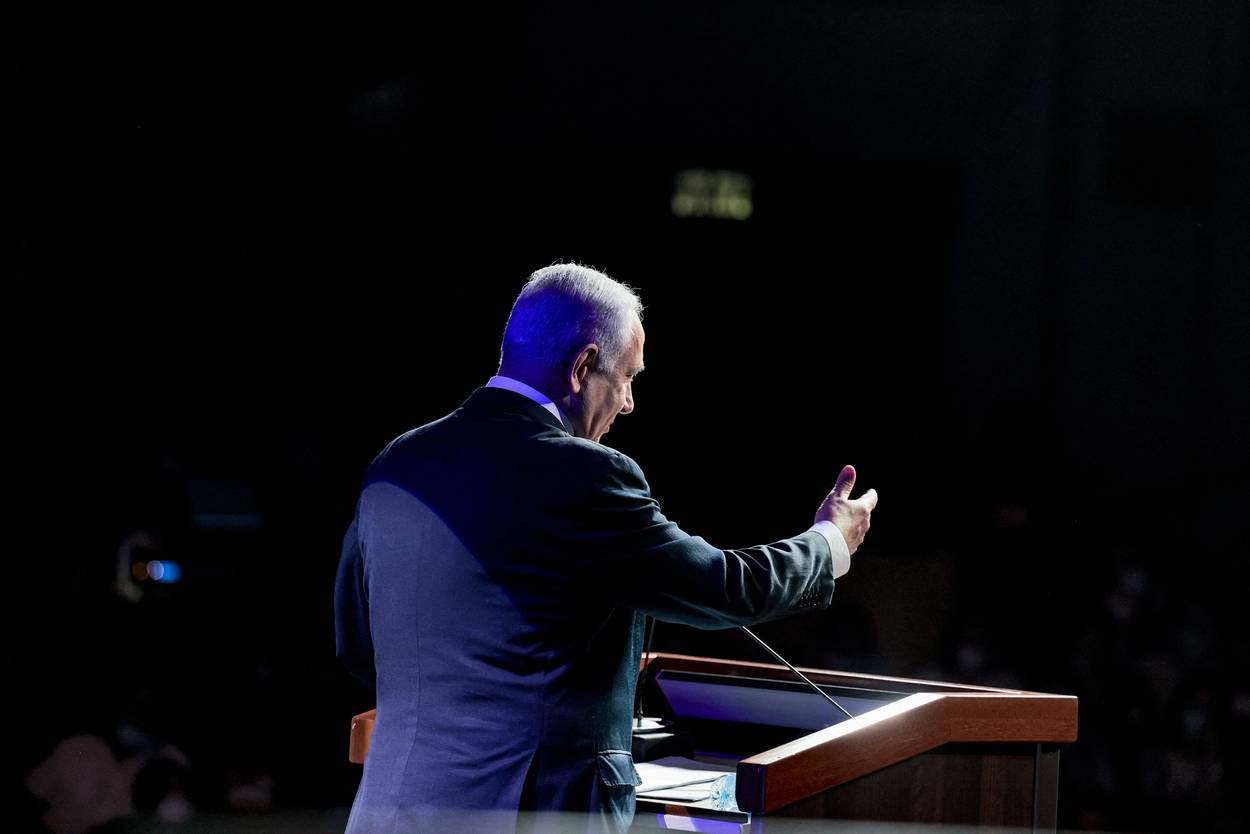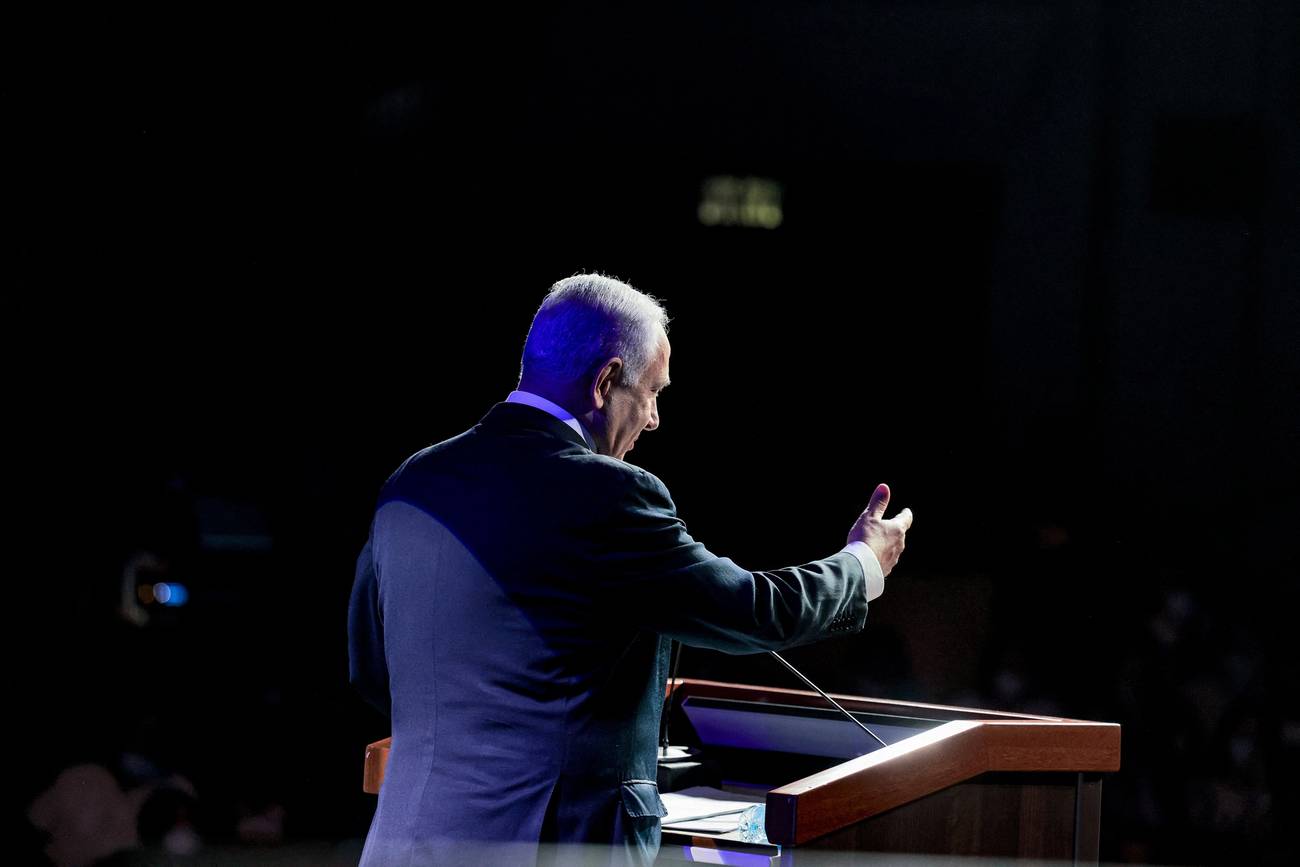Netanyahu’s Next Act
Far from defeated, the perennial Israeli prime minister is already plotting his comeback. Here’s how he plans to do it.




Last Sunday, progressives in Israel and beyond rejoiced as Benjamin Netanyahu was replaced as prime minister, a position he’d held for 12 consecutive years. But if Bibi’s opponents want this change to be more than momentary, they would be wise to temper their celebrations. Israel’s perennial premier isn’t going anywhere—and not just because he won’t be vacating the prime minister’s residence until early July. Far from fading away, he has a multi-pronged plan to reclaim his role atop the Israeli political pyramid, and has already begun to execute it.
A revealing exchange was captured on film the day Netanyahu was officially ousted. As the former prime minister traversed the parliament with his entourage, he was accosted by a reporter who asked, “Will there be an orderly transfer of power?” In a rare loss of public composure, Netanyahu sarcastically snapped, “No, there will be a ‘revolution’!” He then paused and added: “What idiotic questions.” You don’t have to understand Hebrew to get the gist:
The fact that Netanyahu ultimately gave way to his opponents, however begrudgingly, puzzled those who expected him to evoke his own January 6 moment. But this misunderstands Israel’s longest-serving leader entirely. Netanyahu doesn’t want to destroy the country. He intends to rule it. This is the difference between Donald Trump, a narcissistic man-child who cares about no one but himself, and Netanyahu, a right-wing populist—and it’s why the latter has long been a much more formidable politician. The contrast is obvious when one compares how Trump handled the coronavirus (initially denying it outright and later undermining public health measures) as opposed to how Netanyahu did (personally filming ads encouraging masks, distancing, and vaccination, culminating in Israel’s world-beating reopening).
Unlike Trump, an incompetent and capricious con man, Netanyahu—like many other conservative nationalists—has a plan and a vision for his country’s success. He sees his current exile not as his end, but as a temporary setback that he will soon overcome. There’s no need to bring down the system, in other words, when you intend to run it again. Netanyahu remains Israel’s opposition leader, waiting in the wings to resume office should the current government fall.
To that end, Netanyahu has already set in motion the machinery for his return. His two-pronged effort to sabotage the new Israeli government at home and abroad began in the Knesset on the same day it was sworn in. To begin with, incoming Israeli Prime Minister Naftali Bennett was not permitted to deliver his inaugural speech. Instead, Netanyahu-allied lawmakers repeatedly interrupted him with accusations of treason and worse, making it impossible for Bennett to finish his sentences.
While the Israeli parliament is infamously unruly, nothing like this had ever transpired during a changing of the guard. And it could not have happened without Netanyahu’s tacit approval. This was a straightforward bottom-up effort to delegitimize the incoming administration—a refusal to grant it the basic deference normally given to the office. One can expect other petty humiliations of the new government from Bibi’s band going forward.
Following the brigading of Bennett, Netanyahu himself took the podium and launched into the top-down part of his plan. After extolling his own accomplishments, the outgoing prime minister pivoted to an unlikely subject: the Biden administration. “The new American administration asked me to keep our disagreements on the nuclear matter behind closed doors and not to make them public. I told them I would not do so,” he declared. “I told U.S. Defense Secretary Austin who visited here a few weeks ago, ‘As the prime minister of Israel, I will do everything to oppose an agreement that will lead to the nuclear armament of Iran. And we will show our opposition to the agreement that you are proposing, both publicly and operationally.’”
The intent of this broadside against Israel’s most important ally was simple: to salt the earth between the incoming Israeli government and the Biden administration, and undermine their efforts to turn the page on Netanyahu’s partisan approach to the U.S.-Israel relationship. The new Israeli government also opposes the Iran nuclear deal, but unlike Netanyahu, it has no desire to blow up its relationship with the American administration over it, and would prefer to be a constructive player at the table and do what it can to influence the final form of a renewed deal.
For Bibi, it is crucial that Bennett and his foreign minister, Yair Lapid, fail in their efforts at American rapprochement, because if they succeed, it would repudiate their predecessor’s entire approach to the subject. Netanyahu spent years turning Israel into a partisan issue in America—ratcheting up tensions with Obama, then obsequiously embracing Trump—and arguing that these tactics were necessary to ensure Israel’s security. If the new government succeeds in engaging successfully with the Democratic administration on a bipartisan basis, Netanyahu’s approach—and its steep costs—would be exposed.
Bibi cannot permit this repudiation of Bibi-ism, so he is doing his best to poison the Bennett-Biden well. This is why he and his allies have begun putting out statements in English attacking his own country’s government and its diplomacy with the Biden administration.
The intent of this (disingenuous) rhetoric is to alienate the Americans while pressuring Bennett into a more maximalist position. If Netanyahu cannot be inside the diplomatic tent for the time being, he will attempt to burn it down.
But there is another target audience for Bibi’s efforts to delegitimize the new Israeli government: the Republican Party.
For years, GOP politicians have worked to turn Israel into a partisan wedge to be wielded against Democrats—and Netanyahu has been happy to lend a hand. As a result, for many Republicans, being “pro-Israel” has become equated with being “pro-Bibi.” But what happens when Israelis choose new leaders who seek to put Israel back on bipartisan footing? Will these putatively “pro-Israel” politicians follow the lead of Israel’s elected government, or will they reject its legitimacy and wait for the return of Netanyahu and his polarizing policies? For his part, with his English broadsides against the new Israeli administration, Bibi is attempting to tilt the scales against it.
For now, Republican leadership has largely embraced the current Israeli government. But some voices of dissent and equivocation have already emerged:
Netanyahu will likely seek to stoke this sentiment, possibly by laundering his illegitimacy narrative through sympathetic conservative commentators like talk radio host Mark Levin.
In other words, at the same time that Bennett and Lapid will be working to rebuild Israel’s bipartisan standing, Netanyahu will be working to erode it among both parties, all in service of toppling his rivals and reclaiming his throne.
Between bottom-up efforts to delegitimize the new Israeli government at home, and top-down efforts to sabotage it abroad, Netanyahu has already created a potent pincer to pressure his opposition. If they’re going to counter this maneuver, the new government and its allies abroad will need their own compelling message and political wins to put Netanyahu on the defensive, and keep him out of his old office.
Until then, Bibi isn’t going anywhere—and anyone counting him out is sorely underestimating Israel’s shrewdest politician.
Yair Rosenberg is a senior writer at Tablet. Subscribe to his newsletter, listen to his music, and follow him on Twitter and Facebook.